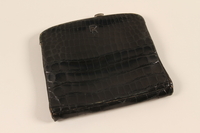Overview
- Description
- The papers consist of a Russian affidavit for Jakob Fajnsztejn (donor's grandfather), seven postcards from the Warsaw ghetto, one letter and envelope from ghetto, one Red Cross letter from the ghetto, two identification cards, three "official" false birth certificates, and one letter from the American Consul General in Sweden.
- Date
-
inclusive:
1940-1948
- Credit Line
- United States Holocaust Memorial Museum Collection, Gift of Alicia Fajnsztejn Weinsberg
- Collection Creator
- Alicia F. Weinsberg
- Biography
-
Alicia Weinsberg (born Alicja Fajnsztejn) was born on October 3, 1929 in Warsaw, Poland to Izaak and Malka (Steinberg) Fajnsztejn. Her father was an engineer and she had one sister, Zofja (b. 1936). The family was quite well-to-do and owned several properties in Warsaw. In October 1940, one year after the German invasion of Poland, the family was forced to move into the Warsaw ghetto where Alicja and her mother worked in the Toebbens factory while Zofja, who was still quite young, hid under the table where her mother was sewing. Later, it was arranged that Zofja leave the ghetto with an aunt and her two daughters. They were taken in by a former maid, Helena Biczyk, and her husband Jozef, who had worked as the superintendent of one of Izaak Fajnsztejn's properties.
In January 1943, Alicja was also smuggled out of the ghetto. After living in various hiding places, she also went to live with the Biczyks, where she remained for more than a year under the false name of Jadwiga Kapinska. Eventually, Alicja's parents came to hide there as well. The Biczyks pretended the two girls, Alicja and Zofja, were their cousins and even sat with them for a formal family portrait. The Fajnsztejns lived in the laundry room, located in the attic of the Biczyk's basement apartment. The Fajnsztejns supported themselves by selling off jewelry and one of their properties. In February 1945, soon after the liberation of Warsaw, the family left for Otwock, and in September 1945, with the help of the Bricha, they left Poland. After traveling through Czechoslovakia, Hungary, and Austria, they finally made their way to the American zone in Germany and lived for the next few years in the Foehrenwald displaced persons camp. Alicja immigrated to the United States aboard the SS Marine Jumper from Bremen in March 1948. In 1982 Jozef and Helena Biczyk were recognized by Yad Vashem as Righteous Among the Nations.
Physical Details
- Extent
-
1 folder
Rights & Restrictions
- Conditions on Access
- There are no known restrictions on access to this material.
- Conditions on Use
- Material(s) in this collection may be protected by copyright and/or related rights. You do not require further permission from the Museum to use this material. The user is solely responsible for making a determination as to if and how the material may be used.
Keywords & Subjects
- Topical Term
- Jewish ghettos--Poland--Warsaw.
- Personal Name
- Fajnsztejn, Jakob.
Administrative Notes
- Holder of Originals
-
United States Holocaust Memorial Museum
- Legal Status
- Permanent Collection
- Provenance
- The papers were donated to the United States Holocaust Memorial Museum by Alicia Fajnsztejn Weinsberg in 2002.
- Record last modified:
- 2023-11-14 14:41:43
- This page:
- https://collections.ushmm.org/search/catalog/irn510346
Download & Licensing
- In Copyright - Use Permitted
- Terms of Use
- This record is not digitized and cannot be downloaded online.
In-Person Research
- Request 7 Days in Advance of Visit
- Plan a Research Visit
-
Request in Shapell Center Reading Room
Bowie, MD
Contact Us
Also in Alicia Fajnsztejn Weinsberg collection
Consists of a purse owned by the donor's aunt and kept by Alicia Weinsberg in hiding; a Russian affidavit for Jakob Fajnsztejn (the donor's grandfather); seven postcards from the Warsaw ghetto; one letter and envelope from the ghetto; one Red Cross letter from the ghetto; two identity cards; three false birth certificates; and one letter from the American Consul General in Sweden. Also includes other materials concerning the wartime experiences of the donor's family. Some of these materials may be combined into a single collection in the future.
Alicia Fajnsztejn Weinsberg papers
Document
Contains ten postcards sent from the Warsaw Ghetto to the United States, one certificate from the International Red Cross, a telegram sent informing Alicia Fajnsztejn Weinberg's uncle about survivors from his family, one black and white photograph of Alicia Fajnsztejn Weinberg and her cousin, and one black and white photograph of Alicia Fajnsztejn Weinberg, her sister, Zofja Fajnsztejn, and Josef and Helena Biczyk.
Alicia Fajnsztejn Weinsberg papers
Document
Contains one Warsaw ghetto arm band belonging to Alicia Fajnszetjn Weinsberg, eight legal documents, two envelopes, two invitations, two programs, one brochure, one report card, one menu, and two newspaper clippings pertaining to Alicia Fajnstejn Weinsberg's Holocaust experiences.
Alicia Weinsberg papers
Document
Contains letters from a Munich displaced persons camp in Germany to Alicia Weinsberg in New York City (1948-1950) and restitution papers for Malka Feinstein.




